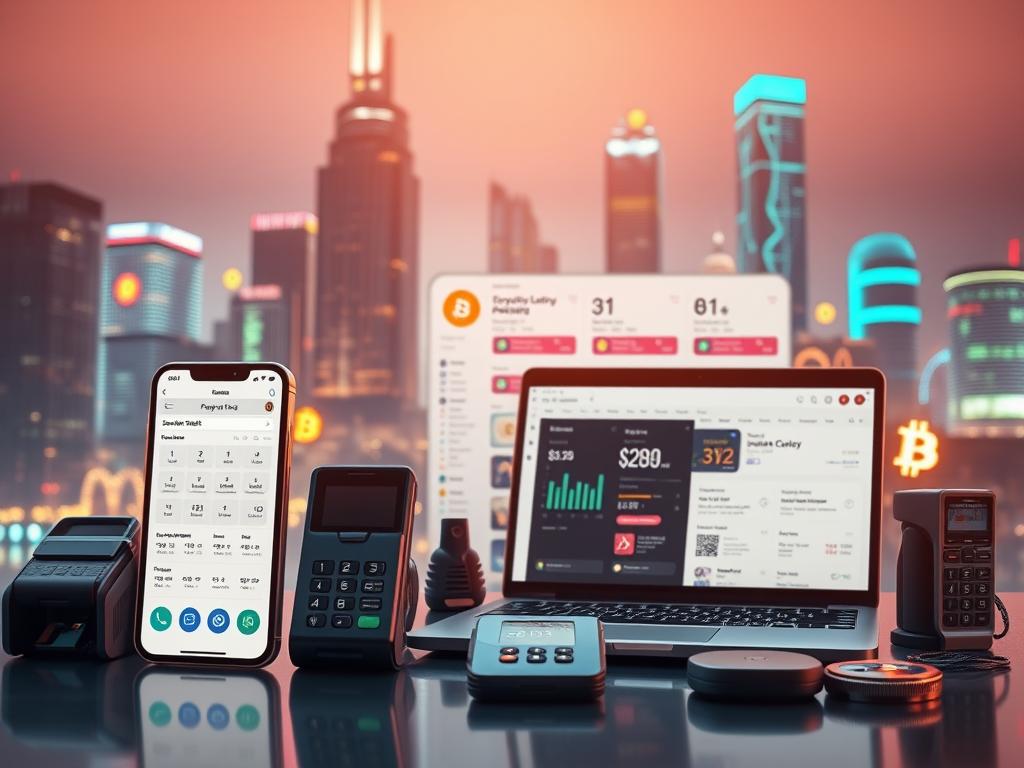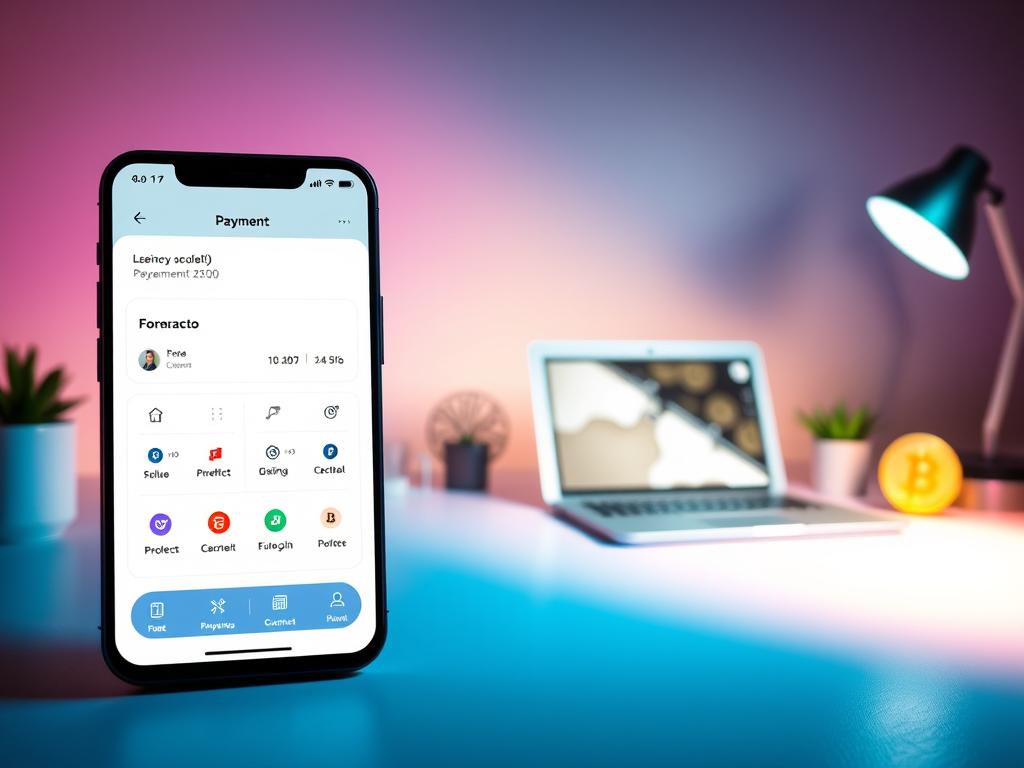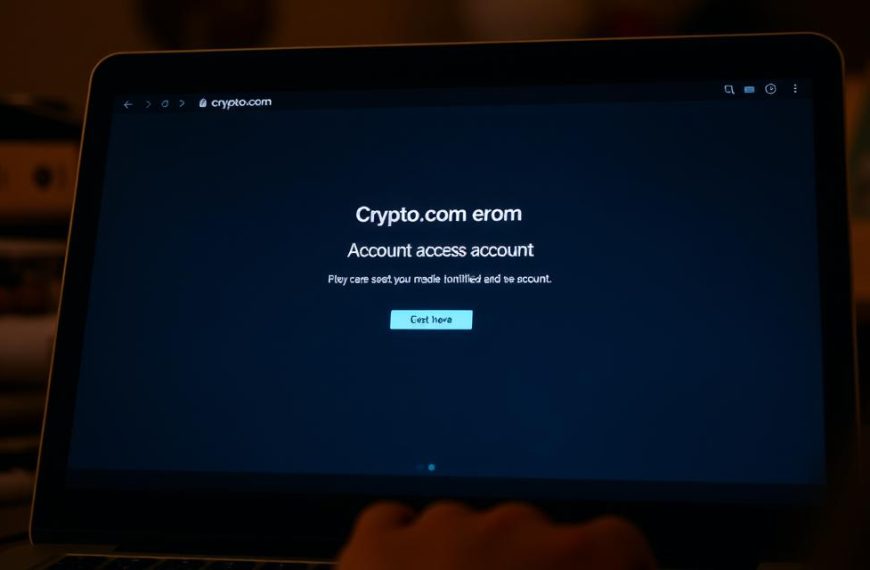Digital currency is changing how we handle money globally. Cryptocurrency offers new ways to exchange value quickly and flexibly. It’s reshaping financial transactions worldwide.
Most merchants now show interest in accepting cryptocurrency. This signals a big shift in payment methods. Young people are leading this change, wanting more chances to use crypto wallets.
Cryptocurrency transactions have great benefits. Some platforms allow transfers with tiny fees. Others offer fee-free transactions that are approved within seconds.
Big companies like AMC Theatres and Microsoft now accept digital currencies. This shows that cryptocurrency is becoming a trusted payment method.
This guide will help you understand digital currency transactions. You’ll learn how to use crypto payments safely and effectively. Discover how cryptocurrency can change the way you handle money.
Understanding Cryptocurrency Fundamentals
Cryptocurrency is a revolutionary approach to digital finance. It challenges traditional monetary systems with innovative technology. These digital currencies use blockchain to create secure, decentralised financial transactions.
Digital currencies offer a fascinating landscape of financial innovation. Unlike government-controlled money, cryptocurrencies operate on a different paradigm. They provide a unique approach to financial transactions and value storage.
What Sets Cryptocurrency Apart
Digital currencies distinguish themselves through several key characteristics:
- Decentralised nature without central bank control
- Secured by cryptographic techniques
- Transparent transaction records
- Global accessibility
Blockchain: The Technological Backbone
Blockchain technology is the critical infrastructure for cryptocurrencies. It creates an immutable, distributed ledger that records all transactions transparently. Bitcoin, the first cryptocurrency, introduced this groundbreaking approach to financial record-keeping.
| Cryptocurrency | Market Position | Key Characteristic |
|---|---|---|
| Bitcoin | First and Most Traded | Pioneered Blockchain Technology |
| Ethereum | Second Most Valuable | Supports Complex Transactions |
| Altcoins | Diverse Alternative Options | Specialised Use Cases |
Types of Digital Currencies
The cryptocurrency ecosystem includes various digital assets:
- Bitcoin (BTC): The original cryptocurrency
- Ethereum (ETH): Smart contract platform
- Stablecoins: Cryptocurrencies pegged to traditional currencies
- Utility tokens: Used for specific blockchain platforms
Pew Research Center data from 2021 showed growing acceptance of digital currencies. 16% of Americans have invested in or used cryptocurrency. This trend suggests increasing mainstream adoption of these digital financial tools.
Essential Tools for Cryptocurrency Payments

Digital currencies require key tools for payments. Over 580 million people use cryptocurrencies worldwide. Choosing the right crypto wallets, exchanges, and payment gateways is vital.
Crypto wallets store and manage digital assets. Users can pick from two main types:
- Hot Wallets: Software-based digital wallets accessible online
- Cold Wallets: Hardware devices offering enhanced security for storing cryptocurrencies
Digital exchanges are crucial in the cryptocurrency world. These platforms allow users to buy, sell, and trade various digital assets. They provide liquidity and easy access to cryptocurrencies.
The future of financial transactions lies in understanding and leveraging cryptocurrency payment technologies.
Payment gateways are vital for businesses accepting cryptocurrency. They enable smooth transactions with lower fees. These systems allow instant cross-border payments.
Innovative solutions support over 300 cryptocurrencies. Merchants can easily add new payment options for their customers.
- Transaction fees are typically lower than traditional payment methods
- Two-factor authentication enhances account security
- Real-time transaction tracking simplifies payment management
Cryptocurrency use is growing rapidly. Understanding these tools is crucial for individuals and businesses. They help leverage digital currency technologies effectively.
How to Pay via Cryptocurrency
Cryptocurrency payments have transformed digital transactions. They offer a smooth way to exchange value. Over 2,350 US businesses now accept cryptocurrency, making it crucial to understand the payment process.
Users must grasp the basics of digital wallet setup and blockchain verification. The process starts with creating a secure digital wallet. This wallet is your gateway to cryptocurrency payments.
Setting Up Your Digital Wallet
A digital wallet is your personal cryptocurrency hub. To set up a robust digital wallet, follow these key steps:
- Choose a reputable wallet provider
- Create a strong, unique password
- Enable two-factor authentication
- Securely store your private key
- Verify your identity (if required)
Sending and Receiving Crypto Payments
Crypto transactions are surprisingly simple. Most payments require scanning a QR code or entering the recipient’s public key. Transaction times vary based on network traffic.
Bitcoin payments usually process in a few minutes to an hour. The exact time depends on how busy the network is.
Verifying Transactions on the Blockchain
Blockchain verification ensures security and transparency for every cryptocurrency transaction. Each payment is recorded on a decentralised digital ledger. This provides an unchangeable record of the exchange.
The beauty of cryptocurrency lies in its ability to facilitate global transactions without intermediaries.
Most consumers (73%) prefer digital payment methods. Cryptocurrency represents the future of financial transactions. It offers a flexible, global payment solution for various purchases.
You can use crypto for buying electronics, supporting charities, or purchasing game tickets. Its versatility makes it a popular choice for many transactions.
Popular Cryptocurrency Payment Methods
Cryptocurrency payments have transformed digital asset transfers and spending. With about 1 billion users worldwide, digital currencies offer innovative solutions beyond traditional banking.
Crypto enthusiasts now have several handy payment options. These include crypto debit cards, QR code payments, and peer-to-peer transfers.
- Crypto debit cards that function like traditional bank cards
- QR code payments for instant transactions
- Peer-to-peer transfers with minimal transaction fees
Companies like BitPay have made cryptocurrencies more accessible. Their platform supports over 100 crypto wallets, enabling quick transactions within minutes.
Crypto debit cards are a major leap in digital payment tech. These cards work wherever Mastercard is accepted. They let users convert cryptocurrency into spendable funds easily.
QR code payments have made peer-to-peer transfers simpler. Users can now complete transactions quickly using just their smartphones. This eliminates complex traditional banking processes.
The future of payments is digital, decentralised, and remarkably convenient.
Cryptocurrency payments are set to grow rapidly. They’re projected to increase by 17% annually from 2023 to 2030. This growth suggests these payment methods will become more common.
Major Companies Accepting Cryptocurrency
Crypto-friendly businesses are growing rapidly. By late 2022, about 2,352 US companies had integrated cryptocurrency payments. This shift shows increasing acceptance of digital currencies in corporate settings.

Companies are drawn to cryptocurrency payments for various reasons. They see it as a way to reach new customers and enjoy lower fees. Crypto also offers an alternative to traditional payment methods.
- 85% view crypto payments as a method to reach new customers
- 77% appreciate lower transaction fees
- Digital currencies offer an alternative to traditional payment methods
Retail Establishments Breaking Ground
Several big retailers have led the way in using cryptocurrencies. Overstock.com was one of the first to adopt digital currencies. Their success showed other e-commerce platforms the potential of this new payment method.
| Company | Crypto Payment Status | Year Implemented |
|---|---|---|
| Whole Foods | Bitcoin via Flexa | 2019 |
| Gucci | In-store Bitcoin payments | 2022 |
| Etsy | Seller-specific crypto options | Ongoing |
Online Services and Platforms
Tech giants are at the forefront of digital currency acceptance. Microsoft started taking bitcoin payments in December 2014. PayPal launched its “Checkout with Crypto” feature in 2021, converting cryptocurrency to regular money automatically.
Entertainment and Food Services
The entertainment sector is also getting on board with cryptocurrency. Several companies have made notable moves in this area.
- AMC Theatres accepts crypto payments for online purchases
- Starbucks integrated bitcoin payments through its app in 2020
- Twitch reinstated cryptocurrency payments in June 2020
More businesses are seeing cryptocurrency as a smart payment option. It helps attract innovative customers and can lower transaction costs. This trend is likely to continue as digital currencies become more mainstream.
Security Measures for Crypto Transactions
Protecting your digital assets requires a strategic approach to crypto security. Private keys are the master password for your cryptocurrency wallet. Keeping these keys confidential is crucial to prevent potential theft.
The cryptocurrency security landscape demands constant vigilance. Two-factor authentication is a vital defence mechanism for cryptocurrency users. It creates an extra barrier against unauthorised account access.
Cryptocurrency exchanges are often targeted by cybercriminals. Major platforms like Coinbase have faced significant security challenges. Users can reduce the risk of asset compromise by using robust two-factor authentication.
The most secure crypto wallets are those disconnected from the internet. Hardware wallets, costing £80 to £160, offer enhanced protection by storing private keys offline. Users should create a twelve-word mnemonic seed phrase for wallet recovery.
Stay alert to potential phishing attacks that might compromise login credentials. Blockchain technology provides a strong foundation for cryptocurrency transactions. Users must be aware of potential network vulnerabilities, such as Sybil attacks.
Understanding these risks is essential for safe crypto transactions. By implementing comprehensive security measures, investors can navigate the cryptocurrency world with confidence.
FAQ
What is cryptocurrency?
Cryptocurrency is a digital currency using cryptography for security. It operates independently of central banks and runs on blockchain technology. This enables secure, transparent transactions across global networks.
How do cryptocurrency payments work?
Cryptocurrency payments transfer digital assets directly between users through blockchain networks. Network nodes verify transactions and record them on a public ledger. These transfers are faster and often cheaper than traditional methods.
Are cryptocurrency transactions secure?
Blockchain technology ensures high security through complex cryptographic protocols. Each transaction is permanently recorded and extremely difficult to alter. Users must still implement personal security measures like two-factor authentication.
Which cryptocurrencies can I use for payments?
Popular cryptocurrencies for payments include Bitcoin, Ethereum, Litecoin, and Ripple. Many retailers now accept these digital currencies. Bitcoin remains the most widely recognised and adopted option.
What equipment do I need to make cryptocurrency payments?
You’ll need a digital wallet and access to a cryptocurrency exchange. A device with internet connectivity is also essential. Smartphone apps and desktop wallets offer convenient payment solutions.
How do transaction fees compare to traditional banking?
Cryptocurrency transaction fees are typically lower than traditional banking fees. This is especially true for international transfers. Fees vary based on network congestion and the specific cryptocurrency used.
Can I convert cryptocurrency back to traditional currency?
Yes, most cryptocurrency exchanges allow conversion to traditional currencies. You can sell your cryptocurrency at current market rates. The funds can then be transferred to your bank account.
What are the tax implications of cryptocurrency payments?
Tax regulations for cryptocurrency vary by country. In the UK, HMRC requires individuals to declare cryptocurrency gains. It’s best to consult a tax professional for specific guidance.
How quickly are cryptocurrency transactions processed?
Transaction speeds vary by cryptocurrency. Bitcoin might take 10-60 minutes, while Ethereum processes transactions in seconds. Other cryptocurrencies offer even faster processing times.
Are cryptocurrency payments anonymous?
Cryptocurrencies offer enhanced privacy but are not completely anonymous. Blockchain transactions use pseudonyms instead of personal identities. Some cryptocurrencies provide more privacy-focused features than others.









